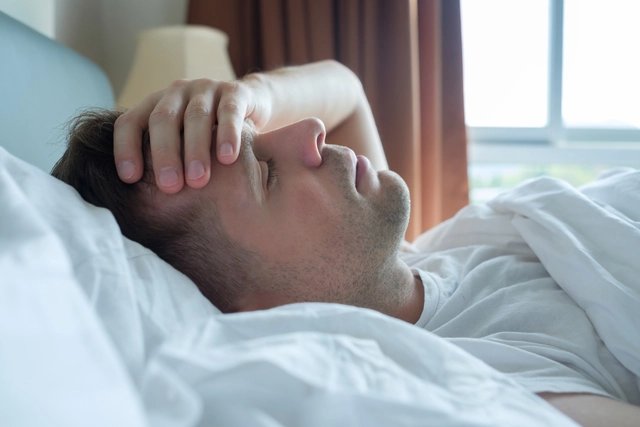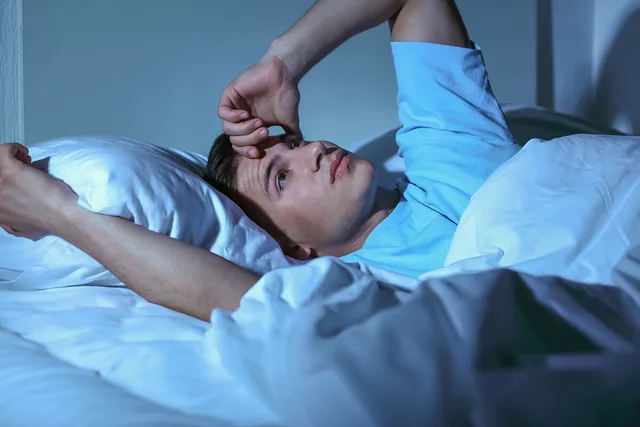Understanding Sleep Disorders and Headaches
As someone who has experienced both sleep disorders and headaches, I understand the frustration and impact they can have on daily life. In this article, I will discuss the connection between sleep disorders and headaches, and provide insights into the potential causes and treatments available. Let's dive in and explore this topic together.
The Science Behind Sleep and Headaches
It is no secret that sleep plays a crucial role in our overall health and well-being. When we don't get enough sleep, our bodies and minds can suffer in various ways, including the onset of headaches. The science behind this connection is complex, but it primarily involves the brain's neurotransmitters and pain receptors. If the balance of these chemicals in our brain is disrupted due to lack of sleep, it can result in headaches or migraines. This is why it is essential to pay attention to our sleep patterns and make adjustments if necessary.
Common Sleep Disorders Linked to Headaches
There are several sleep disorders that have been linked to headaches, and understanding them can help us identify potential triggers and find appropriate treatments. Some of the most common sleep disorders associated with headaches include:
Insomnia
Insomnia is characterized by difficulty falling asleep, staying asleep, or waking up too early in the morning. This lack of quality sleep can lead to tension headaches or even migraines, as our brain's neurotransmitters become imbalanced.
Sleep Apnea
Sleep apnea is a disorder where an individual's breathing is repeatedly interrupted during sleep. This can lead to fragmented sleep and low oxygen levels in the blood, which can trigger morning headaches.
Restless Leg Syndrome (RLS)
RLS is a sleep disorder that causes an overwhelming urge to move the legs, especially at night. This can lead to disrupted sleep and, consequently, headaches.
Identifying Your Sleep Disorder Triggers
To determine if your headaches are related to a sleep disorder, it is essential to identify any potential triggers. Some common triggers for sleep-related headaches include:
- Poor sleep hygiene (e.g., irregular sleep schedule, using electronic devices before bed)
- Stress and anxiety
- Alcohol or caffeine consumption
- Medications
- Environmental factors (e.g., noise, light, temperature)
Keeping a sleep diary can help you track your sleep patterns and identify any potential triggers for your headaches. This information can be useful when discussing your concerns with a healthcare professional.
Seeking Professional Help
If you suspect that your headaches are related to a sleep disorder, it is essential to seek help from a healthcare professional. They can help you identify the underlying cause of your sleep problems and recommend appropriate treatments. This may include lifestyle changes, medication, or even specialized therapies such as cognitive-behavioral therapy for insomnia (CBT-I) or continuous positive airway pressure (CPAP) for sleep apnea.
Implementing Healthy Sleep Habits
Regardless of whether your headaches are directly linked to a sleep disorder, implementing healthy sleep habits can still benefit your overall health and well-being. Some tips for improving your sleep include:
- Establishing a regular sleep schedule
- Creating a relaxing bedtime routine
- Limiting exposure to screens before bedtime
- Maintaining a comfortable sleep environment
- Exercising regularly and managing stress
By prioritizing your sleep and making adjustments to your sleep habits, you may find that your headaches become less frequent or less severe.
Conclusion
In conclusion, the connection between sleep disorders and headaches is undeniable. By identifying potential triggers, seeking professional help, and implementing healthy sleep habits, you can take steps toward reducing the frequency and severity of your headaches. Remember, you don't have to suffer in silence. Speak to a healthcare professional if you suspect your headaches may be related to your sleep patterns, and take proactive steps to improve your overall health and well-being.



Robert Jaskowiak
May 27, 2023 AT 19:56Well, it's almost comical how we think powering through the night will make us more productive, only to wake up with a pounding headache that screams, “Nice try!”-but hey, at least we get to enjoy that beautiful *morning haze* while our brain chemistry does a chaotic tango.
Julia Gonchar
June 2, 2023 AT 14:50Actually, multiple peer‑reviewed studies have demonstrated that fragmented REM sleep can increase CGRP levels, a neuropeptide directly implicated in migraine pathophysiology, so the link isn’t just anecdotal.
Annie Crumbaugh
June 8, 2023 AT 04:10Sleep problems can make your head hurt, especially when you’re tossing and turning all night.
Vic Harry
June 13, 2023 AT 14:43America needs solid sleep habits or we’ll keep nagging ourselves into chronic pain because nobody respects the importance of a good night’s rest
Suman Wagle
June 18, 2023 AT 22:30Oh, the great cosmic joke-that the very thing we turn off to escape the world-sleep-ends up being the mastermind behind our throbbing temples, as if the universe decided to pun us for staying up binge‑watching.
Neil Sheppeck
June 24, 2023 AT 03:30Imagine your brain as a bustling city at 2 a.m.: traffic lights flicker, street vendors shout, and suddenly a construction crew (aka poor sleep hygiene) decides to reroute the main artery, causing a downtown traffic jam that feels a lot like a migraine.
Stephanie S
June 29, 2023 AT 05:43Indeed, maintaining consistent sleep patterns-such as going to bed at the same hour each night, limiting screen exposure before bedtime, and creating a tranquil environment-can markedly reduce the frequency of tension‑type headaches, as numerous clinical guidelines affirm.
Bradley Fenton
July 4, 2023 AT 05:10Track your sleep and headaches in a simple spreadsheet; look for patterns, and discuss them with your doctor.
Wayne Corlis
July 9, 2023 AT 01:50Sleep, that elusive mistress, has long been the subject of poets and physicians alike, each claiming to have uncovered its mysteries.
Yet, despite centuries of admiration, we continue to treat it as an optional accessory, much like a garnish on a hurried sandwich.
When we deny our bodies the restorative embrace of nocturnal repose, the brain-ever the diligent accountant-begins to tally deficits.
Neurotransmitters, those microscopic messengers, become unbalanced, and the resulting chaos is nothing short of a biochemical uprising.
Enter the headache, a brutish sentinel announcing the consequences of our nocturnal negligence.
It is, in a manner of speaking, the body's way of reminding us that we are not machines, despite the endless stream of self‑help articles urging us to ‘just push through.’
Moreover, the literature is replete with evidence that conditions such as insomnia, obstructive sleep apnea, and restless‑leg syndrome can each serve as a catalyst for cranial pain.
Take insomnia, for instance: the mere act of lying awake, counting endless sheep, can inflate cortisol levels, setting the stage for vascular constriction.
Sleep apnea, on the other hand, repeatedly starves the brain of oxygen, a situation reminiscent of a car sputtering without fuel, inevitably leading to an engine‑knocking headache.
Restless‑leg syndrome forces the sleeper into a perpetual dance, disrupting the delicate choreography required for deep, restorative phases.
All of this, dear reader, coalesces into a perfect storm where the brain, starved for proper rest, erupts in pain.
One might argue that the solution is as simple as establishing a bedtime routine, yet the modern world delights in sabotaging such simplicity with endless notifications.
Thus we find ourselves stuck in a paradox: we know the cure but remain unwilling to sacrifice the fleeting pleasures of late‑night scrolling.
If we could only summon the discipline to treat sleep as sacred, perhaps the migraine‑laden mornings would become a relic of a less enlightened era.
Until then, we shall continue to chase caffeine, blame stress, and lament the throbbing pressure behind our eyes.
In short, the connection between sleep disorders and headaches is not merely correlative; it is a causative chain that we, as modern beings, have the power to break-if we dare to respect the night.
Kartikeya Prasad
July 13, 2023 AT 19:43😂 Spot on, Wayne! Your poetic rant perfectly captures why my insomnia feels like a tragic opera, and now my head’s pounding like a drum solo at 3 am. Thanks for the reminder to actually turn off the phone-maybe the universe will mercy‑grant me a headache‑free sunrise. 🌅
HARI PRASATH PRASATH
July 18, 2023 AT 10:50Well, your emoticon‑laden drivel is as insightful as a teacup without tea, truly a masterpiece of vacuous commentary. Perhaps if you spent less time on screen and more on substantive research, your head wouldn't be a perpetual circus of pain.
Andrew Miller
July 22, 2023 AT 23:10Another day, another throbbing ache that mirrors the emptiness I feel inside-sleep is just a distant memory.
Brent Herr
July 27, 2023 AT 08:43We have a moral duty to prioritize our health; ignoring sleep is essentially neglecting the body God gave us, and the resulting headaches are a just punishment for that hubris.
Julius Adebowale
July 31, 2023 AT 15:30Data shows sleep deprivation correlates with migraines; ignore it and suffer.
KISHORE KANKIPATI
August 4, 2023 AT 19:30While the stats are stark, remember each night of restful slumber is a step toward reclaiming your canvas of well‑being-keep at it, and the pain will fade like ink in water.
Jefferson Vine
August 8, 2023 AT 20:43Did you know the “sleep industry” allegedly hides natural cures for insomnia to keep us dependent on their gadgets? It's a grand narrative that explains why headaches keep spreading like rumors.
Ben Wyatt
September 7, 2023 AT 19:56Stay hopeful! Small tweaks-like dimming lights an hour before bed and practicing deep breathing-can gradually quiet those pesky headaches and bring back restful nights.